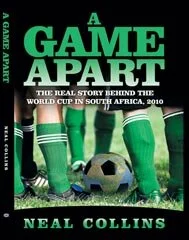A Game Apart - Reviews
Amazed by Amazon... two reviews of A GAME APART I thought you might like to read...
|
DAVID BRYSON, one of the top reviewers on Amazon, has put up this review of my first novel, A GAME APART. He gave it five stars – and touched on a lot of the areas you hope reviewers will when you set out on the publishing journey. Thanks David. There’s also a review from an M Nelson, which I’ve added below. Please give them both a read and if you’re interested, click through on nealcollins.co.uk or search for the book on Amazon... with Eugene Terreblanche’s death over the weekend it’s a fraught time for the World Cup. I hope my words offer some perspective for football fans planning to travel – or those who will simply watch from home. The background to current events in South Africa is far from simple. Years of discrimination and hatred have been put aside in the name of "peace and reconciliation"... bitter outbreaks are bound to occur. As I said yesterday, we can only pray the voices of sanity prevail. Is this what you would call a novel? At least some of the characters are fictional, although there is probably a strong basis in real life-stories even with these. How close to historical fact the details of the story are I don't know either, but I would guess pretty damn close. This book is more history than anything else. Although the plot line is hung around international football (in America-speak `soccer') don't look for anything here along the lines of Roy of the Rovers. Matches are described with an enthusiast's sense for detail and atmosphere, but one of the things that I like best about the narration is how even these sporting commentaries never lose contact with the basic political thread, the ghastly tale of apartheid in South Africa. I very much doubt that international sport can be separated from global politics. To those who pleaded for that the late James Cameron responded `Go on, just try.' Neal Collins has more sense, however much he loves football for itself he knows what was really important when it was a matter of football in pre-Mandela South Africa, and the games that he describes never become isolated episodes described just for the sake of talking about football. Read also the story about the football player Loan Winger Kadeem Harris. |
|
Somebody called M Nelson added this, shorter review, which is equally satisfiying from my point of view: A story that instantly captures the irrepressible spirit of the Black nation in South Africa. Their generosity, sense of humour and love of the football game along with the traditions and superstitions of their pride culture is portrayed successfully. The immense atrocities and madness South African people were subjected to by the Apartheid regime is captured and the way the author has condensed some of the atrocities committed, shocks one successfully into realising the fight and tragedy that South Africa has been through to achieve the miraculous Rainbow Nation. The book is not all "doom and gloom" however as the sense of humour and the love of the game of football that is so prevalent in South Africa does successfully shine through. SA deserves to host the World Cup 2010! Both of these review can be found at http://www.amazon.com/Game-Apart-Story-Behind-Africa/dp/1449057489/ref=cm. For further info, have a look around nealcollins.co.uk... and for video, http://www.youtube.com/watch?v=eqck5JuZtuc |







